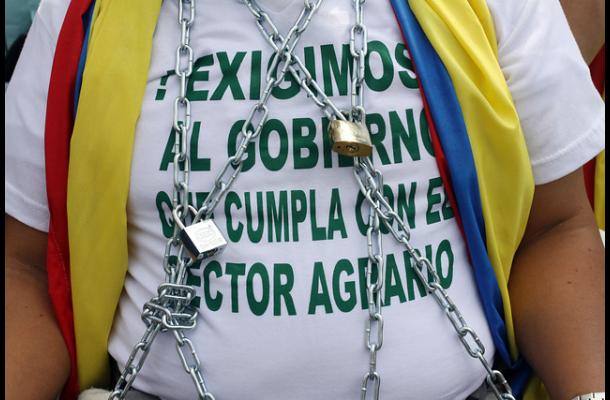Over 120 injured in agrarian strikes: Interior Ministry

Colombia Reports | May 7, 2014
Over 120 injured in agrarian strikes: Interior Ministry
posted by Larisa Sioneriu
Colombia’s Ministry of Interior announced that more than 120 people have been injured as a result of recent confrontations between protesters and riot police during the ongoing nationwide agrarian strikes.
According to the Interior Minister Aurelio Iragorri, 61 policemen and 66 farmers have been injured amid clashes between farmers and authorities since the protests began on April 28, a statement by the ministry released on Tuesday stated.
“We reject these violent actions and the road blockages from the Huila state,” Irragori said in the statement, referring to violent altercations in the central Colombian state.
The continuing agrarian protests turned violent over the weekend in some areas of the country, particularly in the state of Huila, prompting government officials to call for international observers.
Colombian farmers and small-scale miners have been protesting in a number of states across the country to highlight promises they claim the government has not delivered since the previous agrarian strikes last fall.
The talks between the Colombian government and Agrarian Dignity leaders to stop the protests were suspended on Tuesday after both the parties were unable to finalize the issue of refinancing the debts of small farmers.
Weapons found amid protests
According to Colombia’s vice Ombudsman Manuel Sanchez, the authorities have found several home made weapons in Huila state, where confrontations between farmers and riot police have been heavily reported, Caracol Radio announced.
“Public servants of the Ombudsman Office have been able to verify that there were found rifles and glass beads with lead inside, in places where demonstrations and protests are being generated” Sanchez told Caracol Radio.
However, the vice Ombudsman did not specify who the owners of home made weapons were and stated that ”We do not know who is using these kind of weapons and explosives, we do not know if they are members of the security forces, or protesters or people who have infiltrated the protests.”
Before the strikes began, the Defense Minister Juan Carlos Pinzon claimed that illegal armed groups were planning to infiltrate the demonstrations and that it was crucial that protesters be conscious of these armed group and keep the protests orderly and peaceful.
Protesters claim weapons do not belong to them
Wilian Gonzales, leader of striking farmers in Huila, told Colombia Reports that under no circumstances would farmers utilize any kind of the weapons during the protests.
Gonzales said that, due to the amount of people present at the protests, it was unknown weather there are illegal groups infiltrated in the protests or not, including members of the riot police in order to justify violent responses to the strikes.
However, the agrarian leaders dismissed any possibility of farmers carrying weapons during the protests.
“The only weapon we carry with us is a coffee stick. That is what we defend ourselves with against the riot police, which more than anything is a symbol of our identity,” Gonzales told Colombia Reports.
Gonzales also said that near the town of Bruselas, in Huila, there has been a large concentration of striking farmers and due to tear gas released by the police riots many old people and children had to be taken away from the area and a few presented injuries.
In addition, Gonzalez reported that there have been 25 farmers injured in the municipality of Suaza in Huila.
International observers
The mayor of Suaza in the state of Huila asked riot police to refrain from further altercations with protesters as agrarian leaders and government ministers meet in an attempt to broker a deal to stop the demonstrations.
He made a call to international NGOs and the Red Cross to send guarantors for safety during the ongoing strikes.
Patricia Rey, communication coordinator of International Red Cross in Colombia, told Colombia Reports that the organization is already present where the protests take place in order to ensure freedom of speech and peaceful demonstrations.
“We make a call to all those present at the protests to prioritize health emergencies and respect the infrastructure so that ambulances and other medical organisms be able to carry out their work efficiently” said Rey.
Medellin prohibits demonstrations
As the protests continue, the government of Medellin denied the request of 1,500 farmers to march on Wednesday through Colombia’s second largest city on the basis that it did not conform to the legal requirements in order to obtain the appropriate license, according to ADN newspaper.
The vice mayor of Medellin, Luis Fernando Suarez, said that the request had to be submitted 24 hours before the demonstrations and the farmers had failed to do so.
In addition, Suarez said that the request was signed by the same leaders who conducted last year’s protests in the municipality of Barbosa, which turned violent and caused major road blockages.
“We told them that they have the right to free movement and mobilization, but as organizers of a movement with so many people they are responsible for ensuring health conditions, access to food and more, and that they did not ensure any. It is not an attempt against their right to free movement” Suarez told ADN newspaper.






